A Step By Step Guide To Making Salt Dough Fossils
We do love everything about dinosaurs. From simple dinosaur crafts and activities to exploring some of the science behind these prehistoric creatures and investigating how we know what they looked like and when they existed. These easy dinosaur fossils are great to make with kids and use a simple flour dough recipe that you just bake to make fantastic mold fossils of their favorite dinosaurs.
For young children, it’s “just” a fun activity but for older kids, there is actually some science behind it and the process is similar to how mold fossils are made.
Read on for how to make salt dough fossils with kids.

We have included affiliate links to some of the products and resources as an associate we may earn from qualifying purchases.
What are Fossils?
Fossils are a way that we can see what creatures and plants looked like in the past. They are created when an animal like a dinosaur dies, it falls into mud or silt and settles. Over time more sediment covers the animal and this solidifies into rocks.
When the rocks are exposed fossils of the dinosaur bones are found inside them. You either find a cast fossil that looks like the bones of a dinosaur or a mold fossil which is an imprint of the bones and sometimes the skin or feathers of the animal as well.
Read Next: Make a cast fossil with kids
These salt dough fossils make mold fossils however if you want to make a cast fossil the link above will show you how to do it.
Salt Dough Fossil Recipe
Although this activity for kids uses a recipe made with simple ingredients it is really important that you don’t let your kids eat the dough or fossil made and be extra careful if you have pets as the quantity of salt that is used is dangerous to them.
What You’ll Need
Our original simple salt dough recipe is written for the UK in grams so if you are in the US here are the measurements in cups for you. This will make about 8 cookie-sized fossils.
- 1 cup of flour (all purpose)
- 1/2 cup of salt
- 1/2 cup of water
- Bowl
- Small Toy Dinosaurs – we love this set (US Amazon, UK Amazon)
Optional – Acrylic Paints to decorate once dry
Read Next: Fantastic Fun Hands-on Fossil Activities for Kids.
How to Make it
These are really easy to make.
1. Place the dry ingredients into a large mixing bowl and combine salt with the flour.

2. Gradually add in the water to the mixture and blend until you have a dough-like consistency.

3. Remove from the bowl and knead on a lightly floured surface until the dough is smooth.

4. Then break into small balls of dough into small fistfuls.
5. Press these down to about the size of a cookie this will make your fossil discs. There’s no need to roll this dough out you can press it into shape with your hand.
6. Then take your small toy dinosaurs and press into the dough to create a shallow mark that you can see which shows the details of your dinosaur toy.
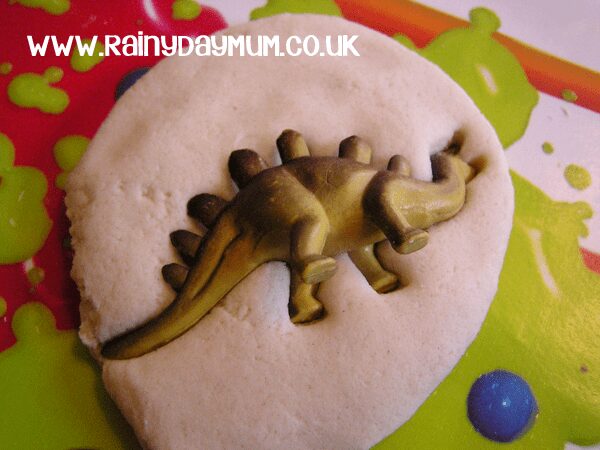
7. Place the salt dough fossils onto parchment paper on an oven-proof tray and place in the oven at the lowest setting and bake for around 2 – 3 hours.
The thicker fossils will take longer and if you have thin fossils you will need to reduce this time.

Once dry you can paint them to look more stone-like and create a better fossil.

We used grey and green paint which the kids thought made them look more realistic.
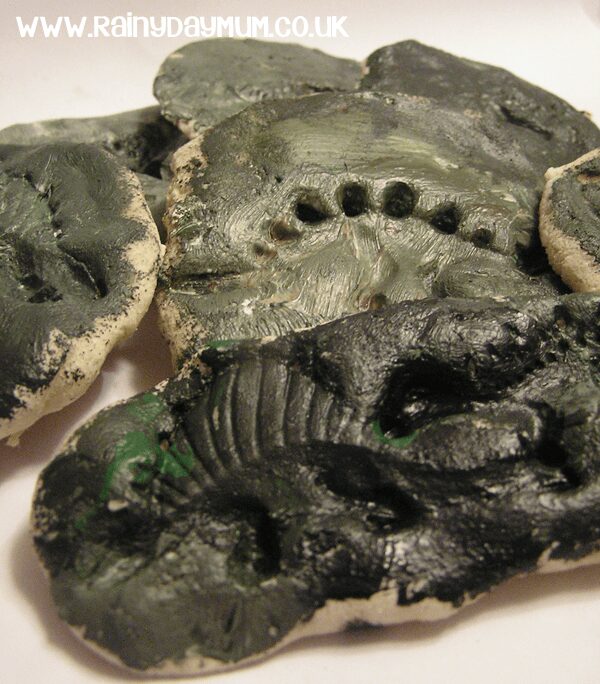
Read Next: DIY Frozen Dinosaur Eggs for Excavation

Fossil Resources to Extend this Activity Further
Encourage more reading and investigation into fossils, rocks and earth science with our favourite earth science books to read to and for kids of all ages.
I’ve found that following the lead with your child’s interest can lead to amazing discoveries for both of you. Throughout this activity I have added further activity suggestions you can find here on Rainy Day Mum however, we are limited as there are only so many hours in the day so these resources from supplies we use and recommend can be used to extend this even further.
If your children are fans of dinosaurs this Dinosaur Discovery kit from Green Kids Crafts is a great way to encourage the topic with 5 projects for science and arts and crafts it is a hit in our house.
We are big fans of National Geographic and their kid’s resources here and have brought this Fossil Mine Dig Kit a couple of times now one for each child and it’s gone down a hit. Unlike some of the other versions that contain a plastic dinosaur to piece together, this contains real fossils a big bonus with my kids holding prehistory in their hands.


Salt Dough Dinosaur Fossils
Equipment Needed
- Toy Dinosaurs
- Paint Brushes
- Bowl
- Rolling Pin
- Baking Tray
Materials Needed
- Salt Dough
- Acrylic paints
- Mod Podge Optional To Seal
Instructions
- When you have made your salt dough split it into 8 similar sized clumps give out to the children.
- Roll the salt dough to approximately 2cm (3/4 inch thick.
- Into the flat surface carefully press a small toy dinosaur.
- To dry the salt dough before painting place on a baking tray and into an oven on the lowest setting for approximately 2hours.
- Once dry – then paint your salt dough fossils to make them look like rocks.
- Leave to dry and if you wish to seal them then apply a coat of mod podge to the dry painted fossil.
Cerys Parker
Cerys is a marine biologist, environmental educator, teacher, mum, and home educator from the UK. She loves getting creative, whether it is with simple and easy crafts and ideas, activities to make learning fun, or delicious recipes that you and your kids can cook together you'll find them all shared here on Rainy Day Mum.


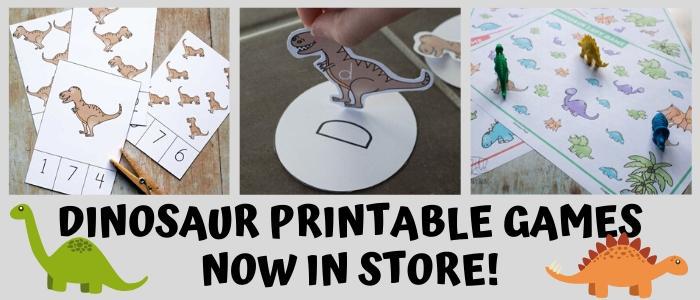
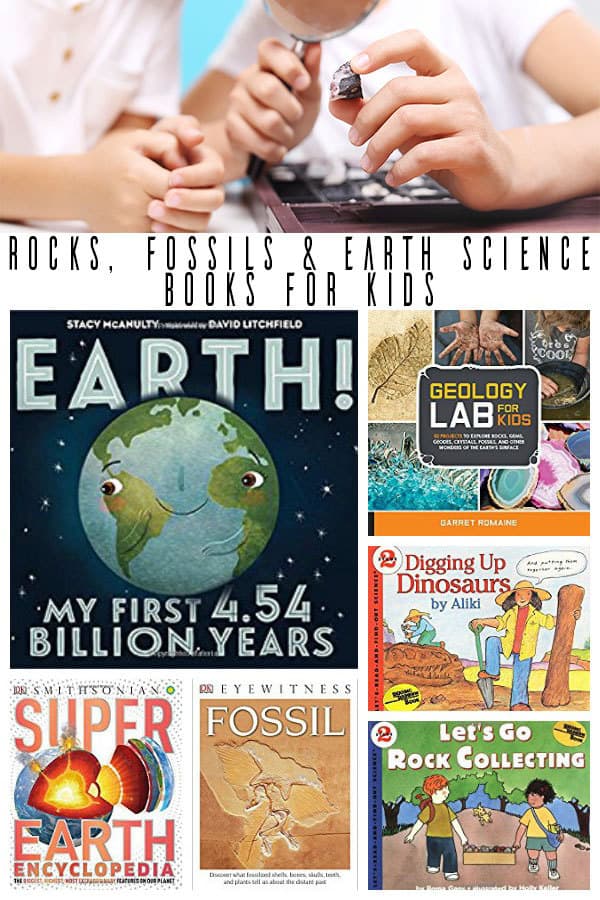
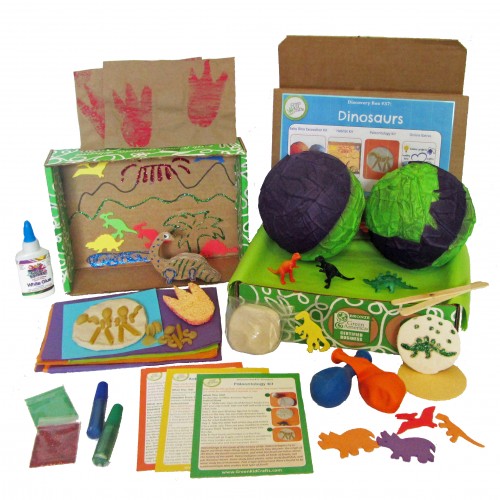
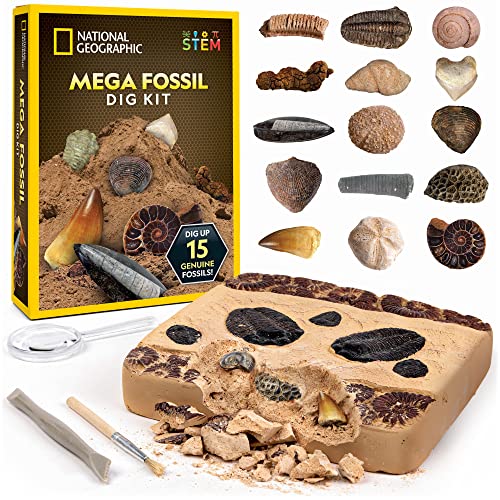
Toby would absolutely LOVE this! He would be beside himself – he’s a future palaeontologist! H 🙂
Ohhh please tag me if you do make them. My two LOVE making them now although thanks to a dig out your own fossil they now make them with skeletons and fossils to create the imprints instead.
Nice idea! This is great for kids who love adventure and fascinated with amazing creatures like dinosaurs. 🙂
I tried adding cinnamon to the dry mixture for a slightly brown tint…..then another batch with paprika that gave them a beautiful sepia tone which looked natural. It was my favorite. …bbut the cinnamon ones smelled great!
I tried this out with my students! They loved it! Thank you for sharing this recipe.
Has anyone tried these without cooling the dough first? I’m going to try these with our classroom, but don’t have an easy fridge nearby. Thanks!
I didn’t cool the dough first….they were fine for me with skipping that step.